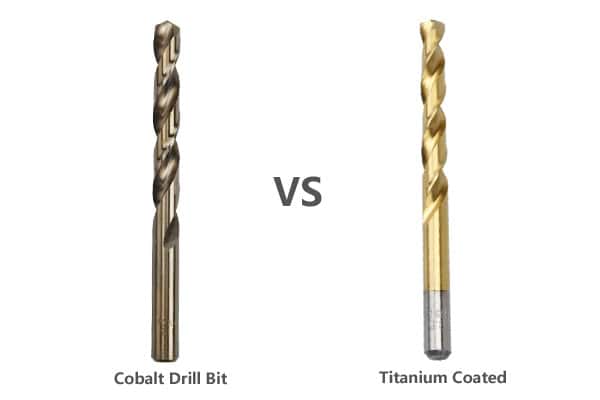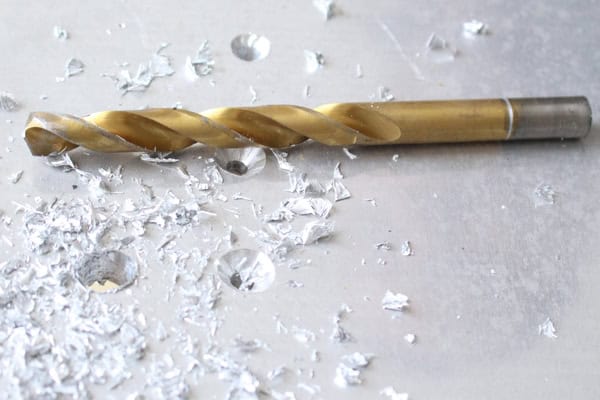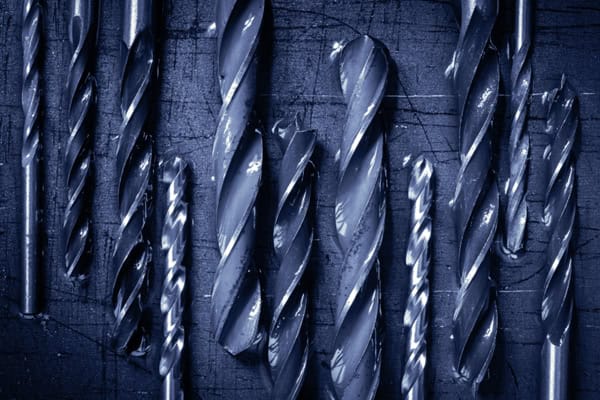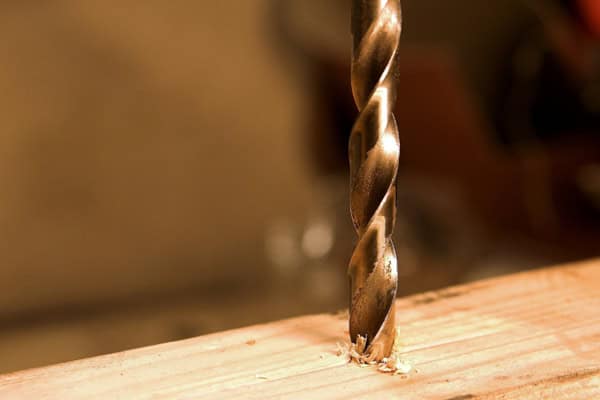Worried about choosing the right drill bit? Don’t sweat it! This guide breaks down cobalt and titanium options.
Cobalt drill bits are best for drilling hard metals like stainless steel. Titanium bits are good for softer materials like wood and plastic, though not always ideal for wood due to potential tearing.

Choosing the right drill bit can be confusing. But knowing the differences between Kobalt1 und Titan2 can save you time and money. Keep reading, and I’ll walk you through it.
When Should you Choose Cobalt Drill Bits?
Frustrated with drill bits that dull quickly? Cobalt drill bits might be your solution.
Cobalt drill bits excel when drilling through hard metals. They stay sharper longer than other bits when working with materials like stainless steel and cast iron.

Cobalt drill bits are made from a high-speed steel alloy that includes 5-8% cobalt. This makes them very heat resistant3, which is key when drilling hard metals. The heat from drilling can quickly ruin other types of bits, but cobalt bits maintain their hardness and cutting ability even at high temperatures.
Here’s a table that summarizes the benefits of cobalt drill bits:
| Feature | Benefit |
|---|---|
| Heat Resistance | Stays sharp longer, even at high speeds, reducing the need for frequent replacements. |
| Haltbarkeit | Lasts longer than standard HSS or titanium bits, saving you money in the long run. |
| Härte | Effective on tough materials like stainless steel, cast iron, and titanium. |
| Schärfung | Can be resharpened, extending their lifespan, unlike some coated bits. |
| M35 vs. M42 | M35 is suitable for handheld drills, while M42, with higher cobalt content, is better for controlled pedestal drills. |
I remember a time when I was working on a project involving stainless steel. I started with regular high-speed steel bits, and they were dulling after just a few holes. I switched to cobalt bits, and the difference was night and day. They sliced through the stainless steel with ease and lasted the entire project!
While cobalt drill bits might cost more upfront, their durability and performance4 make them a worthwhile investment for anyone who regularly works with hard metals. If you’re a professional or a serious DIYer, cobalt drill bits are a must-have in your toolbox.
What are Titanium Coated Drill Bits Used For?
Need a versatile drill bit for various materials? Titanium-coated drill bits might be the answer.
Titanium-coated drill bits are great for general-purpose drilling. They work well on wood, plastic, and soft metals. However, for wood, specialized wood drill bits are often better to prevent tearing.

Titanium-coated drill bits are made of high-speed steel (HSS) with a thin layer of titanium nitride (TiN)5 on the surface. This coating adds hardness and reduces friction, which helps the bit last longer than standard HSS bits. However, the coating is thin and can wear off with use, especially if you’re drilling hard materials.
Here’s a breakdown of the pros and cons of titanium-coated drill bits:
| Feature | Benefit | Drawback |
|---|---|---|
| Vielseitigkeit | Suitable for plastic and soft metals like aluminum. Can be used on wood, but specialized wood bits are preferable. | Not ideal for very hard metals like stainless steel or cast iron. Using HSS bits on wood can sometimes cause splintering or tearing if not careful. |
| Kosteneffektivität | More affordable than cobalt drill bits. | Coating can wear off, reducing effectiveness over time. |
| Heat Resistance | Better heat resistance than standard HSS bits. | Less heat resistance than cobalt drill bits. |
| Haltbarkeit | Lasts longer than standard HSS bits due to the titanium coating. | The coating will fall off when sharpening |
I’ve found titanium-coated bits to be perfect for most of my DIY projects around the house. Whether I’m drilling holes in wood for a new shelf or working with aluminum for a small metalworking project, these bits get the job done without breaking the bank. However, when working with wood, I’ve noticed that using a bit designed specifically for wood gives a cleaner hole with less splintering.
If you need a drill bit for a wide range of materials and don’t want to spend a fortune, titanium-coated drill bits are a solid choice. They offer a good balance of performance and value, making them a great addition to any toolkit. Just be aware that for wood, you might want to consider a specialized wood drill bit6 for the best results.
Drill Bits Buying Guide
Overwhelmed by the different drill bit options? Here’s what to consider before buying.
When buying drill bits, think about the material you’ll be drilling, the size of the hole you need, and the type of drill you’re using. Choosing the right drill bit ensures efficiency and precision.

Choosing the right drill bit involves several factors. Here’s a guide to help you make the best choice:
-
Material:
- Holz: Use wood drill bits (brad point), flat bits, or auger bits.
- Metall: Use HSS, cobalt, or titanium-coated bits.
- Mauerwerk: Use masonry bits with tungsten carbide tips.
- Multi-Material: Use multi-purpose bits with carbide tips.
-
Bohrermaterial:
- HSS (High-Speed Steel): Good for plastic and soft metals. Can be used for wood, but use with caution to avoid tearing.
- Kobalt: Best for hard metals like stainless steel.
- Titanium-Coated: Versatile for general use on plastic and soft metals.
- Hartmetall: Ideal for masonry, tile, and very hard materials.
-
Size and Type:
- Durchmesser: Choose the right diameter for your hole. Start small and increase if needed.
- Twist-Bits: General-purpose for various materials.
- Spade Bits: For drilling large holes in wood.
- Step Bits: For drilling different-sized holes in thin materials.
- Lochsägen: For making large-diameter holes.
-
Drill Compatibility:
- Schafttyp: Ensure the shank fits your drill’s chuck (straight, hex, SDS).
- Chuck Size: Match the bit shank size to your drill’s chuck size (3/8-inch or 1/2-inch).
-
Coatings:
- Titanium Nitride (TiN): Increases wear protection.
- Titanium Aluminum Nitride (TiAlN): For higher cutting speeds.
- Schwarzes Oxid: Resists corrosion and increases durability.
-
Merkmale:
- Split-Point Tips: Prevent the bit from wandering.
- Spitzenwinkel: Flatter points (135-degree) for harder materials, steeper points (118-degree) for softer materials.
I always keep a variety of drill bits on hand. A good set of HSS bits for general use (but I’m careful when using them on wood), a set of cobalt bits for metalworking, and some masonry bits for any concrete or brick projects. For woodworking, I prefer using brad point bits.
By considering these factors, you can choose the right drill bits for your projects. This will improve your efficiency7 and ensure you get the job done right8!
How to Stop a Drill Bit from Slipping on Metal?
Annoyed by drill bits sliding off metal surfaces? There are easy fixes.
To stop a drill bit from slipping on metal, create a small indentation using a center punch and hammer. This gives the bit a starting point and prevents it from wandering.

Drilling into metal can be tricky, but here are some methods to prevent the drill bit from slipping:
-
Use a Center Punch:
- Mark the spot where you want to drill with a center punch and hammer.
- This creates a small dent that guides the drill bit and keeps it from wandering.
-
Start with a Pilot Hole:
- Drill a small pilot hole first, then use a larger bit to create the final hole.
- The pilot hole provides a guide for the larger bit.
-
Use a Self-Centering Drill Bit:
- These bits have a special tip that helps them stay in place.
- They’re great for drilling round surfaces like pipes.
-
Clamp the Workpiece:
- Secure the metal piece with clamps to prevent it from moving.
- This provides a stable surface for drilling.
-
Apply Cutting Oil:
- Use cutting oil to lubricate the drill bit and reduce friction.
- This helps the bit cut more smoothly and prevents it from overheating.
-
Use the Right Drill Speed:
- Drill at a slow, steady speed to prevent the bit from slipping.
- Too much speed can cause the bit to bounce off the surface.
-
Check the Drill Chuck:
- Ensure the drill bit is tightly secured in the chuck.
- A loose chuck can cause the bit to slip.
-
Clean the Chuck and Bit:
- Remove any dirt or debris from the chuck and bit.
- A clean chuck provides better grip.
I learned the center punch trick years ago, and it’s been a lifesaver. Before that, I was constantly chasing the drill bit around the metal, making scratches and inaccurate holes.
By using these tips, you can prevent your drill bit from slipping and create clean, accurate holes9 in metal every time.
Fazit
Choosing between cobalt and titanium drill bits depends on the job. Cobalt bits are tougher for hard metals. Titanium bits are more versatile for everyday use, just be mindful of potential tearing when using them on wood.
-
Explore the benefits of cobalt drill bits to understand why they might be the best choice for your drilling needs. ↩
-
Discover the advantages of titanium drill bits and how they can enhance your drilling efficiency and longevity. ↩
-
Understanding heat resistance can help you choose the right drill bits for tough materials. ↩
-
Learn how durability and performance influence your choice of drill bits for better results in your projects. ↩
-
Discover the uses of titanium nitride (TiN) in coatings to understand its benefits in enhancing tool performance. ↩
-
Learn about the advantages of using specialized wood drill bits for optimal performance in woodworking projects. ↩
-
This resource offers valuable tips and techniques to boost your efficiency in DIY tasks, making your projects smoother and faster. ↩
-
Learn from experts about best practices that guarantee quality results in your home improvement projects. ↩
-
Discover expert advice on techniques and tools that guarantee clean and accurate holes in metal, enhancing your projects. ↩